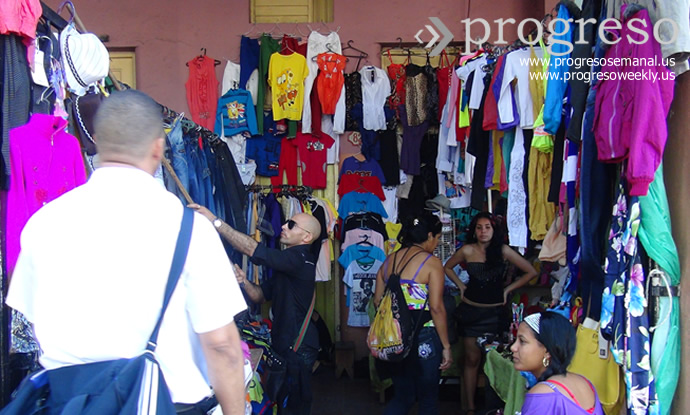
From fig leaves to Cuban seamstresses
Why not allow self-employed importers?
HAVANA – From the fig leaves (the first natural and thoroughly ecological garment, an item that responded to urgent needs related not only to modesty but also to the climate, humidity, etc.) to Cuban seamstresses and tailors, there is a leap of thousands of years, with a stopover on the island. Let me explain myself.
At the same time that new private activities are being authorized, the regulations that govern the manufacture and sale of clothing are being strictly enforced. For the past three years, vendors sold clothing made by seamstresses who opened minishops outside or inside their homes, as well as clothes that came from abroad.
Both the clothes manufactured under license and the clothes imported via the so-called “mules” were sold in peace and quiet. (“Mules” are travelers from abroad – mainly from Florida, Ecuador and Mexico – bringing suitcases bulging with merchandise. They are the carriers who supply the market of clothing, among other goods.)
The latest is that today, after years of overseeing an open trade, the authorities will enforce the law rigidly: vendors may only sell clothing manufactured by local seamstresses and tailors. The sale of industrially made clothing is now forbidden and reduced to the network of official stores, all of them state-owned.
“This will ruin me,” Olga told me. “Making a dressing gown today and another one in the next three weeks, or shortening trouser legs is something that I’ve done ever since my kids were little, and I’m already a grandmother,” she said. For 35 of her 68 years, she has been making garments “for the outside” but “only to survive, not to improve my lifestyle.”
She says she can’t understand the new measure because the quality of her life “was really improving.”
Olga – and other seamstresses who were enthused by the eased regulations – don’t care that the original law classified them as manufacturers of their own products, not as vendors of manufactured clothing. According to the authorities, their licenses don’t include the second activity.
Her husband, Felo, 73, retired, chimes in.
“The law that wasn’t enforced because nothing was hidden [the imported clothing] was useless,” he says. “A law that is not obeyed by the authorities themselves is meaningless and will continue to be broken.” He asks, rhetorically, “Why now?”
In Cuba, especially in Havana, there are numerous state-run clothing stores that carry internationally known brands. But are they profitable?
“The prices [at those stores] are high and sometimes the garments are not ‘in the wave’ [fashionable] because they stay on the racks too long as a result of the high prices,” says Yenisey, 23, a university graduate.
“Some of the clothes in the ‘timbiriches’ [private shops] are ‘in the wave’ and others are in bad taste, they’re ‘cheas,’ [vulgar], but the shops sell you everyday clothes for a good price, with more-or-less acceptable quality,” she tells me.
“What sells for 40 CUC [convertible pesos] in the state-run shops, you can find in the private shops for 15 or 20.”
“When you can choose by taking into account price and quality, you have competition. And that’s good, because it’s to your benefit,” says Rolando, Yanisey’s boyfriend. I met the two at the Miramar Shopping Center, outside one of the shops.
Before they left, I stopped Rolando because I had noticed that his previous answer was incomplete. Speaking more directly, I asked him why he thought that the authorities would be more rigorous with the minishops.
Pointing to the store from which they had emerged, he said, “We’d have to see if these shops are profitable, if they do business. A policy of openness leads to competition.” Although he believes that competition from private shops “is not all that strong right now, [the state-run shops] feel it.”
“All you have to do is look at the ‘paladares’ [private restaurants] and the food carts, always well patronized, while the state-run eateries are in decline,” he said. “Competition works; it benefits us.”
After thanking them for their answers, and while I walk to the street, I think about the new government ruling that allows the existence of home-sale/home-exchange brokers, who are in effect real estate agents.
Wouldn’t be beneficial, I wonder, if the government would consider the return of the private and free importer, along with a smart tariff policy. Might be worth a try.
Progreso Semanal/ Weekly authorizes the total or partial reproduction of the articles by our journalists, so long as the source and author are identified.

